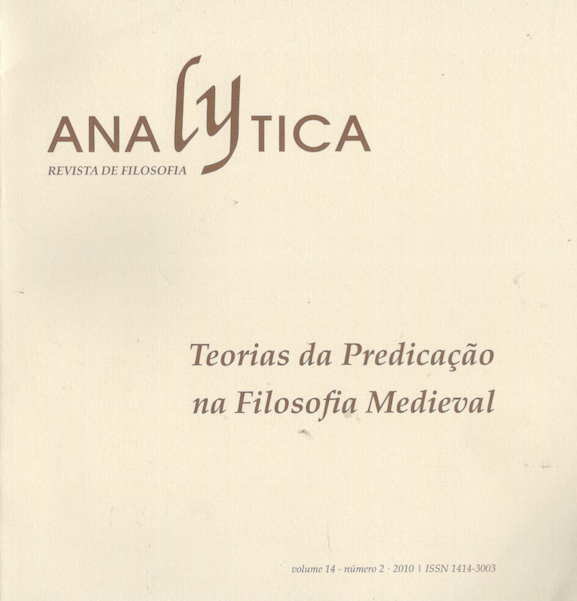Conceito e objeto em Tomás de Aquino
Resumo
A partir das questões suscitadas pelo debate atual entre realistas diretos e representacionalistas na interpretação da teoria do conhecimento de Tomás de Aquino, o artigo analisa as relações entre conceito e objeto, segundo a perspectiva tomásica. O conceito, enquanto termo da primeira operação do intelecto, é um id quod, mas é também um medium in quo, enquanto exprime o objeto que contém intencionalmente. No entanto, a intelecção do objeto requer ainda a 'conversão ao fantasma', que consiste em inteligir no fantasma a quididade universalizada e expressa pelo conceito. Em razão da natureza e da função do conceito e da sua relação com o objeto e do papel da conversão ao fantasma, é legítimo interpretar a teoria gnosiológica de Tomás como uma espécie de representacionalismo não inferencial.
Abstract
From the issues raised by the current debate between direct realists and representationalists on the interpretation of Thomas Aquinas's theory of knowledge, the present paper analyses the relationship between concept and object according to Aquinas's perspective. Insofar as it is a termination of the first intellect's operation, the concept is a id quod, but it is also a medium in quo insofar as it presents the object which it intentionally possesses. However, the intellection of the object still needs the 'conversion to the phantasm', in which the universalized quiddity, expressed through the concept, is apprehended. Due to the nature and function of the concept and its relation with the object, and to the role played by the conversion to the phantasm as well, it is legitimate to interpret Aquinas's gnosiological theory as a kind of non inferential representationalism.
Downloads
Publicado
Edição
Seção
Licença
Os autores que publicam nesta revista concordam com os seguintes termos:
- Os autores mantêm os direitos autorais e concedem à revista o direito de primeira publicação, com o trabalho simultaneamente licenciado sob a Licença Creative Commons Atribuição-SemDerivações 4.0 Internacional (CC BY-ND 4.0), que permite a redistribuição, comercial ou não comercial, desde que a obra original não seja modificada e que seja atribuído o crédito ao autor.
- Os autores têm autorização para assumir contratos adicionais separadamente para distribuição não-exclusiva da versão do trabalho publicada nesta revista (ex.: publicar em repositório institucional ou como capítulo de livro), com reconhecimento de autoria e publicação inicial nesta revista.
- Os autores têm permissão e são estimulados a publicar e distribuir seu trabalho online (ex.: em repositórios institucionais ou na sua página pessoal) a qualquer ponto antes ou durante o processo editorial, já que isso pode gerar alterações produtivas, bem como aumentar o impacto e a citação do trabalho publicado (Veja O Efeito do Acesso Livre).


